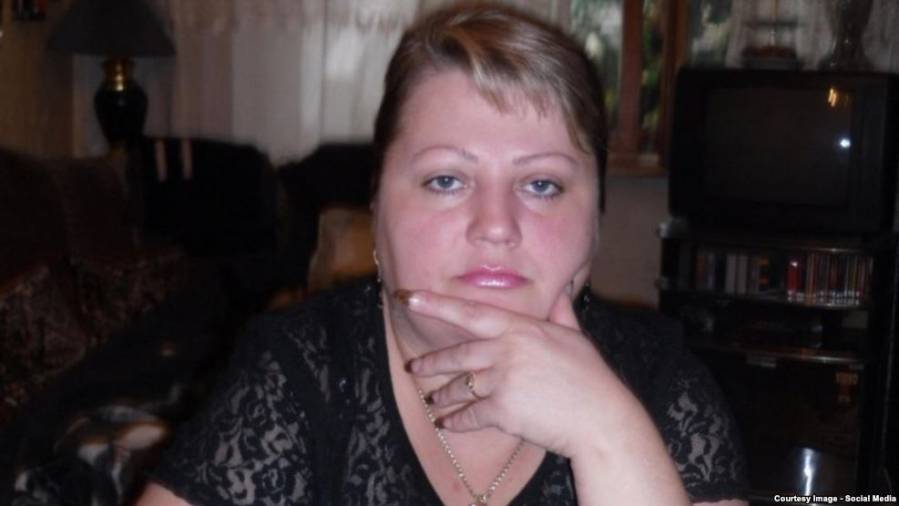Seven years for an SMS: Activists alarmed over Southern Russia treason convictions
http://rferl.org/a/russia-seven-years-prison-treason-text-message/28159839.html
Oksana Sevastidi spent 14 months in pretrial detention, during which time prosecutors questioned her only twice. Her own defense attorney never visited her.
Oksana Sevastidi, a 46-year-old shopkeeper from the Black Sea resort city of Sochi, is serving a seven-year prison sentence for high treason.
Although she was convicted and sentenced in March, Sevastidi's case only became widely known this month, after her desperate relatives contacted the Memorial human rights organization for help appealing the court's ruling.
Even more alarmingly, human rights lawyers say, Sevastidi is just one of at least 10 people similarly charged and sentenced by a secret court in Russia's southern Krasnodar region.
Sevastidi was convicted of sending two SMS messages in the first half of 2008 that the Russian government argued contained secret information about military movements in the direction of the breakaway Georgian region of Abkhazia. Russia and Georgia fought a brief war over Abkhazia and a second Georgian region, South Ossetia, in August 2008, after which Moscow recognized both regions as independent.
Sevastidi still cannot quite believe what happened at her trial, which was held in the basement of the local Federal Security Service (FSB) branch under tight secrecy.
"The prosecutor didn't let me say a word in my own defense," she recalled in an interview with the website Meduza published on December 5. "Everything was done in one day: the arguments, the concluding statements, and the sentence. It was all very fast and mixed up, like in a dream. And as if through a shroud, I heard the words 'seven years.'"
The speed of the trial contrasted sharply with the pace of the pretrial proceedings. Sevastidi was arrested by the Krasnodar branch of the FSB in January 2015. She spent 14 months in pretrial detention, during which time prosecutors questioned her only twice. Her own defense attorney never visited her.
"When my mother called him, he hung up," Sevastidi told Meduza. "He turned his telephone off."
'A Lot Of Questions'
This month, the Memorial rights group helped Sevastidi hire defense attorney Ivan Pavlov, who specializes in treason cases. Last year, he successfully defended Svetlana Davydova, a woman from Vyazma who was accused of reporting Russian troop movements to the Ukrainian Embassy. The charges against Davydova were dropped for lack of evidence and the Prosecutor-General's Office sent her a written apology.
Pavlov is now trying to get permission to appeal Sevastidi's verdict, even though her initial attorney failed to meet the filing deadline.
"Sevastidi has filed a complaint with the Krasnodar Krai Chamber of Attorneys about her previous lawyer," Pavlov told RFE/RL's Russian Service. "In it, she confirmed that she asked him to appeal the sentence. Now our colleague will have to answer a lot of questions that are likely to come up among the members of the qualifications commission of the Chamber of Attorneys."
Pavlov said there were a lot of questions about Sevastidi's case. The text messages that she sent mentioned trains loaded with military hardware that were sitting at the Sochi train station. Pavlov said there was no attempt to hide the trains and people were photographing them.
"How could the experts determine their claim that information that everyone could see was a secret?" Pavlov said.
In addition, if the messages were sent in early 2008, why did prosecutors only investigate them in January 2015?
Moreover, Moscow has said it was caught by surprise by the outbreak of fighting in Georgia in August 2008.
"According to the Russian government, there were no preparations [for the August 2008 war], but this sentence, at the very least, says the exact opposite," Pavlov said. "Therefore, if the Russian government says there were no war preparations, then the justification of this sentence is all the more absurd."
Secret Trials
He is skeptical that the answers to these questions will ever emerge.
"I've been practicing law for 20 years," he said, "and I don't have any illusions about whether the organs in charge of criminal prosecutions are going to explain anything to anybody. There were no explanations in the case of Svetlana Davydova."
Pavlov said Sevastidi's case was not unique. The same Krasnodar court sentenced at least 10 people for treason or espionage between 2013 and 2016, lawyers with Pavlov's organization, Komanda 29, have determined, although they have not learned the full names of all the defendants. They have identified the convicting judge as Vladimir Kobzev.
"We do not know and maybe never will learn all the names and the circumstances of their detentions," Komanda 29 wrote in a recent report. "From the FSB basement where the courts are held, the defendants are sent to unknown locations and no one takes any further interest in them."
In November 2014, the court sentenced another Sochi resident, Yekaterina Kharebayeva, to six years in prison for espionage. Her defense lawyers also say the charges stem from an SMS she sent about the movement of Russian military equipment. Earlier this year, she was released and sent to Georgia as part of an exchange of convicted Russian and Georgian citizens.
"Who is being tried there right now, no one knows," the Komanda 29 report concludes. "Most likely, we will only learn the names after they turn up in a prison camp."





